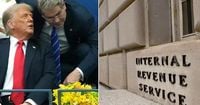On October 20, 2025, a political storm erupted in Washington as Representative John B. Larson of Connecticut joined every Democrat on the influential House Ways and Means Committee to demand an immediate investigation into what they allege is a deeply troubling attempt by the Trump Administration to weaponize the Internal Revenue Service (IRS) against political opponents. The controversy, first brought to public attention by a recent Wall Street Journal report, has ignited fierce debate over the boundaries of executive power, the sanctity of federal institutions, and the fundamental rights of American taxpayers.
According to the Wall Street Journal, officials within the Trump Administration have been encouraging the IRS to facilitate criminal investigations into individuals and groups known to support the Democratic Party and other so-called “left leaning” organizations. The report claims that a senior IRS official has already compiled a list of potential targets, which notably includes several major Democratic donors. The revelations have sent shockwaves through Capitol Hill, with many lawmakers drawing uncomfortable parallels to the dark days of the Watergate era.
“Chris Murphy said it best on the floor of the Senate: ‘The authoritarian takeover isn’t coming. It’s here.’ We’ve already seen Trump’s weaponization of the justice system — going after James Comey and Letitia James with sham indictments. Now, he’s trying to turn the IRS into a twisted, partisan tool – targeting Americans who stand up to him,” Rep. Larson declared in a statement released by his office. His words echoed a growing sense of alarm among his Democratic colleagues, many of whom see the alleged IRS targeting as part of a broader pattern of executive overreach.
In direct response to the report, Larson and his fellow committee Democrats sent a formal letter to Heather M. Hill, the Acting Inspector General for Tax Administration, demanding a thorough investigation into the Trump Administration’s actions. Their letter was uncompromising in tone, warning that the situation “is reminiscent of President Nixon when he directed the IRS to audit and harass his ‘political enemies.’” Drawing on legal precedent, the letter cited Section 7217, which explicitly prohibits the President, the Vice President, and any employee of their respective offices from requesting, directly or indirectly, that the IRS conduct an audit or investigation of any specific taxpayer.
“There ought to be a full investigation into this Nixonian-like campaign of political retribution. President Trump swore an oath to the Constitution, but he sees it as merely a suggestion to consider. We the people will not stand for his continued abuses of power,” Larson added in his public remarks, underscoring the gravity with which committee members are treating the allegations.
The Democrats’ letter to Inspector General Hill is just one prong of their response. They have also written to Jason Smith, Chair of the Ways and Means Committee, urging him to convene a special meeting with Treasury Secretary Scott Bessent. Their aim is to scrutinize not only the alleged plans to target taxpayers for their political beliefs but also reported efforts to conduct mass layoffs at the IRS—actions that, according to the Democrats, have not been authorized by law.
“Americans all across this country are experiencing the hardship and growing chaos created by an out-of-control President with an out-of-touch agenda under one-party Republican rule in Washington,” the Ways and Means Democrats wrote, voicing concerns that extend beyond the IRS controversy to encompass broader anxieties about governance and accountability.
At the heart of the matter is the integrity of the IRS, an agency that, for decades, has been expected to operate above the partisan fray. The notion that the tax agency could be used as a bludgeon against political adversaries is not only alarming to lawmakers but also to watchdog groups and legal scholars. Section 7217, the statute invoked by the Democrats, was enacted precisely to prevent this kind of abuse, following revelations during the Nixon Administration that the IRS had been used to target the President’s so-called enemies list.
The current allegations, if substantiated, would mark a significant escalation in the ongoing battle over the politicization of federal agencies. For some observers, the situation conjures up memories of past IRS scandals—most notably, the controversy during the Obama Administration, when the agency was accused of unfairly scrutinizing conservative nonprofit groups. That earlier episode triggered bipartisan outrage and led to a series of reforms designed to insulate the IRS from political pressure. Now, with the pendulum apparently swinging in the opposite direction, lawmakers are once again sounding the alarm.
Supporters of the Trump Administration, for their part, have pushed back against the Democrats’ accusations, arguing that the IRS has long been subject to political interference from both parties. Some have suggested that the Democrats’ calls for investigation are themselves politically motivated, designed to score points in an already heated election season. Others maintain that the reported plans are simply routine law enforcement efforts aimed at rooting out tax evasion, regardless of political affiliation.
Yet, the specificity of the Wall Street Journal report—particularly the claim that a list of Democratic donors has already been compiled—has made it difficult for critics to dismiss the concerns as mere partisan posturing. The fact that Ways and Means Democrats have moved swiftly and in unison to demand accountability speaks to the seriousness with which they regard the issue.
For many Americans, the controversy raises fundamental questions about the appropriate limits of executive power and the need for robust checks and balances. If the IRS, with its vast authority over the nation’s finances, can be bent to serve the interests of any administration, what does that mean for the rule of law? And who, ultimately, will hold those in power accountable?
As the investigation gets underway—assuming the Inspector General takes up the Democrats’ call—much will depend on the willingness of Congress to exercise its oversight responsibilities. The Ways and Means Committee, as the chief tax-writing body in the House, has unique authority over the IRS and plays a critical role in safeguarding the agency’s independence. Whether the committee will move forward with a special meeting, as requested, remains to be seen. But the stakes, both for the agency and for American democracy, could hardly be higher.
In the days ahead, all eyes will be on the Inspector General’s office, the Treasury Department, and the leadership of the Ways and Means Committee. With the specter of past abuses looming large, and with trust in government institutions already at a low ebb, the outcome of this latest controversy could have far-reaching implications for the future of federal oversight and the health of the nation’s political system.
As the dust settles and investigations begin, the debate over the proper role of the IRS—and the boundaries of presidential power—shows no signs of abating. For now, lawmakers and citizens alike are left to grapple with the uneasy possibility that the nation’s tax agency may once again be at the center of a political firestorm.




